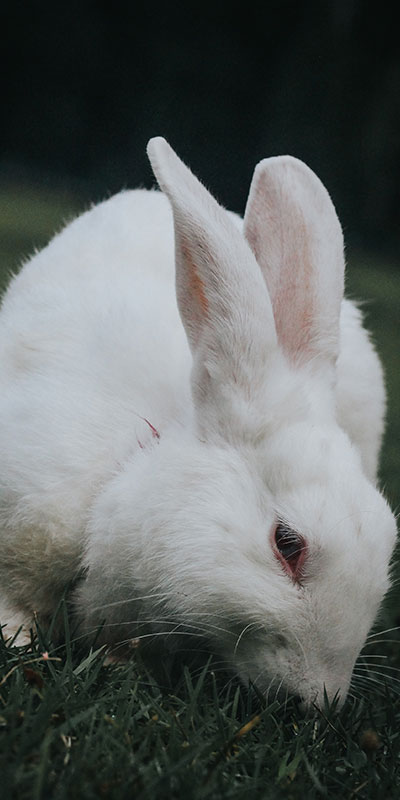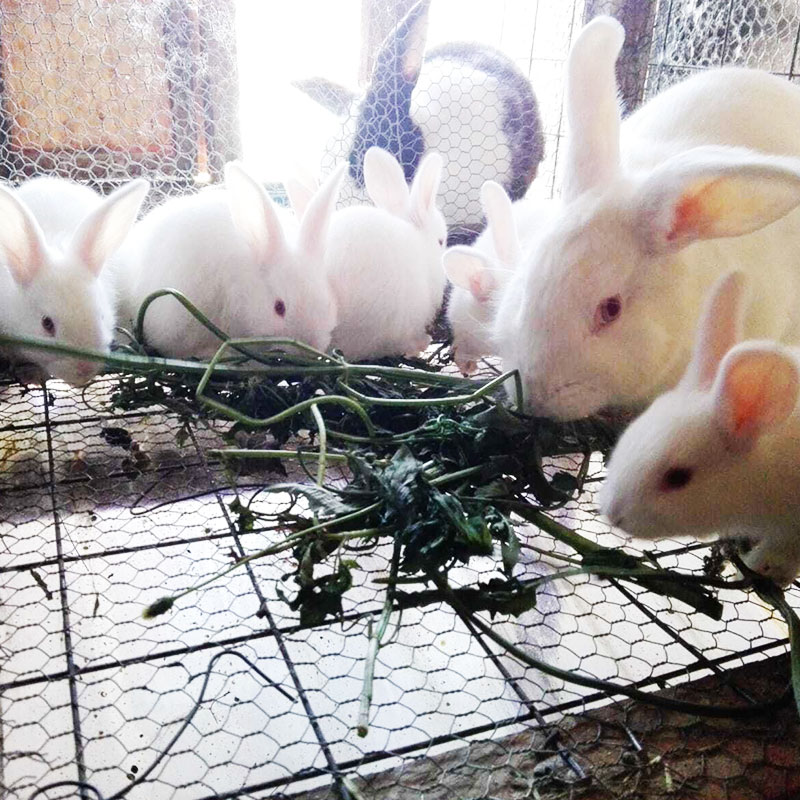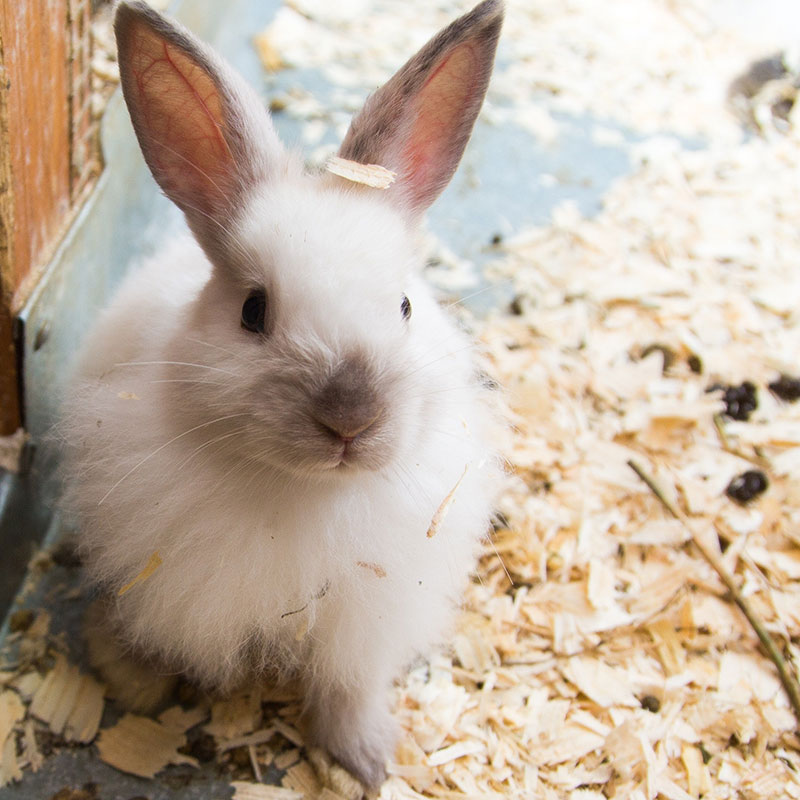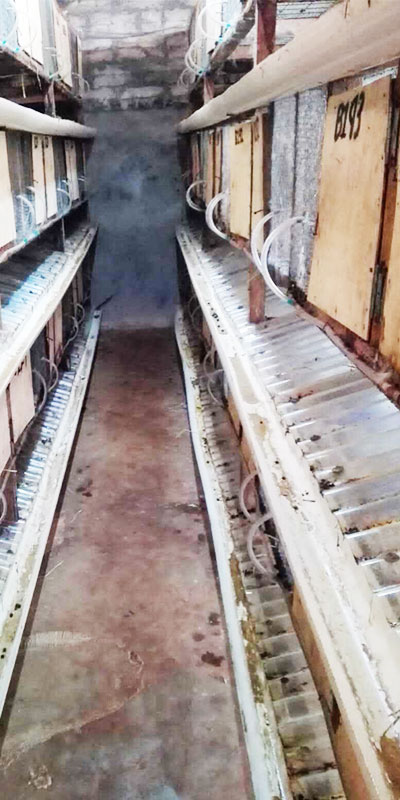RABBITRY
Rabbit Farming
Rabbit farming is officially called cuniculture (from the species name for wild rabbits, Oryctolagus cuniculus). If done right, it can be a profitable venture and a critical part of an integrated organic farm. All rabbit products are usable, there is minimal waste. Rabbits produces meat, pelt (skin), fur, urine (good foliar fertiliser and pest repellent for plants) and manure.
Vunani AgriVentures has established a commercial rabbitry as part of its integrated sustainable organic farm, our rabbits:
- produce manure and urine used on the farm to provide high quality organic fertilizers and organic pesticide on the farm
- are fed on the highly nutritious weeds from the farm which would otherwise go to waste
- produce high quality breeder stock sold to aspiring farmers and pet owners
- produce meat sold in the market offering an extra income stream.
We have implemented an electronic record management system that provides all round technology-based record keeping. The system permits traceability of our stock including detailed genealogy record keeping that supports documents our breeding management. Buyers of our breeder stock and pet owners get a complete printed genealogy record of each rabbit they purchase.
Vunani sells high quality breeder rabbits to aspiring farmers and pet rabbits to families who would want to keep rabbits as pets.
Why Rabbit Farming
Rabbits are an affordable, lean, tasty, protein source, they offer an alternative to more traditional meats . This is increasing rabbit meat demand.
Rabbits are a very efficient feed converter and thus profitable if properly managed. Because of this efficiency in feed conversion (with no methane emission), coupled with their ability to feed on many plants that would otherwise be weeds on the farm rabbit farming is a highly environmentally sustainable source of protein.
Rabbits are prolific breeders, when well looked after could produce litters of 6-8 kits at each breeding, the kits take about 12-16 weeks to mature A breeding doe can produce up to six litters annually.
Rabbits require minimal space compared to most other farm animals, rabbits are an asset to the diversified farmscape. A rabbitry can be set-up in the little used areas of the farm and patched on marginal land unproductive land.
Nutritional Benefits
Rabbit is classified as a white meat along side chicken. White meats are healthier than red meat. Rabbit meat is more nutritious than chicken due to its higher protein, phosphorus, calcium content and low fat ratio. Furthermore, it has lower fat, sodium, and calorie composition than chicken.
Feed Efficiency
Rabbits are more efficient at converting feed to meat than many larger animals. Feed conversion ratio ( FCR) is a measure of an animal’s efficiency to convert feed into body mass. It indicates how efficient an animal is to convert feed mass to the body weight. A farm owner wants to have low FCR. Rabbits have one of the lowest FCRs which is comparable to insects.
The feed efficiency of rabbits means that they offer “most bang for buck” when it comes to turning consumed feed into meat.
Fast Breeding
From birth to butcher, rabbits fed on a diet of pasture and pellets can be ready to eat in between 12-16 weeks. And, because the gestation period for rabbits is only thirty days, you can have a steady stream of rabbits available by staggering your breeding dates monthly.
Rabbit are prolific breeders, using an average litter size of six, a single breeding pair of rabbits (doe and buck) can produce up to 36 baby rabbits (kits) a year. That is breeding 6 times at year (kits weaned at six weeks). That’s around 125 kilograms of meat a year produced a breeding pair!
Sustainable farming
Rabbit farming is very light on its impact on global warming including minuscule greenhouse footprint. It has low energy intensity, uses very little land (and can use unproductive land areas) and is very efficient on water use. Rabbit produces one of the lowest methane levels of any grazing animals.
Types of Rabbits in the Vunani Rabbitry
Vunani is rearing a variety of the leading larger meat rabbits including New Zealand white, Chinchilla, California white, Dutch, Rex and Flemish giant.
Rabbit Farming Returns
Dependent on good rabbitry husbandry, rabbit rearing can be very profitable. It does however involve some risks because rabbits are susceptible to several diseases and succumb very quickly. Good and well-structured hygienic housing is critical to disease and pest control as is good feeding. The cages should be spacious, well ventilated and easy to clean. Rabbits require protection from predators and adverse weather and must have a good supply of clean drinking water.




